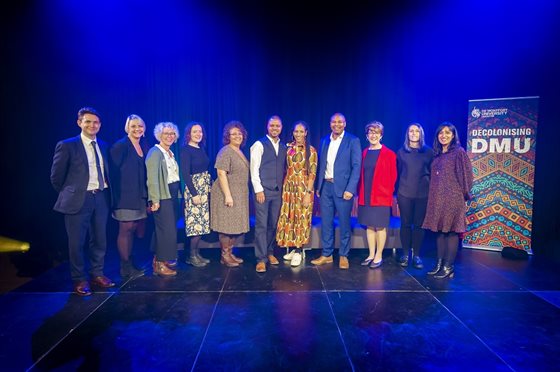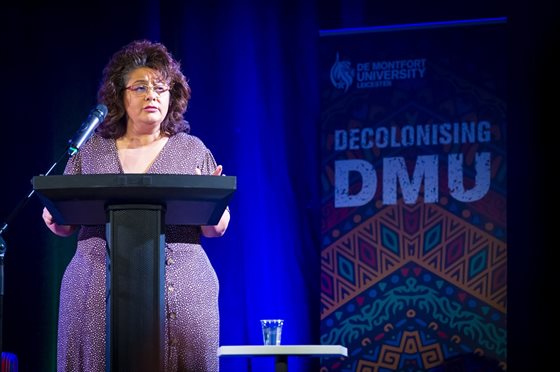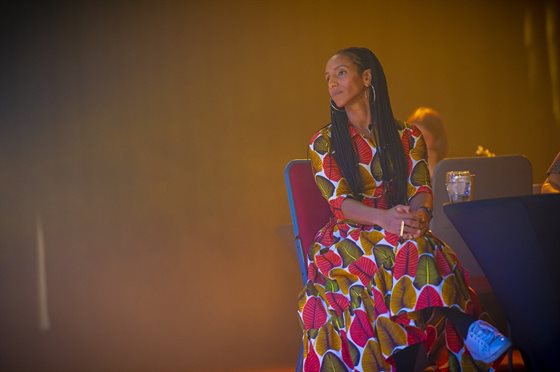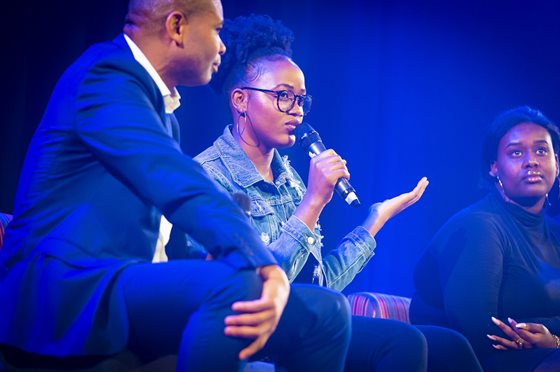DMU takes the lead in tackling BAME attainment gap
De Montfort University Leicester (DMU) is “leading the way” to close the attainment gap for Black Asian and Minority Ethnic (BAME) students in Higher Education.
The institution has launched its ‘Decolonising DMU’ initiative, which encourages staff and students to examine the everyday norms of university life to identify and eliminate systems, structures and behaviours that create disadvantage for ethnic minorities.

Guest speakers join the Decolonising DMU project team at the official launch
During an official launch event at The Venue@DMU, the Head of Culture Change and Leadership for the Department for Education, Rob Neil OBE, told a packed audience of more than 200 guests that DMU was at the forefront of this crucial movement.
“I think it is exciting and it is vitally important because it is bringing us closer to the truth – it’s shining a light on our past and will no doubt inform the future and how we interact, how we learn and what we learn,” said Rob, who mentors public sector organisations to help them improve their approach to inclusion and leadership.
“I know we are on a journey but DMU is leading the way and, in leading the way, will enlighten others,” he added.
Over the last decade there has been an increase of more than 50% in the number of BAME full-time undergraduate students in the UK, yet only 58% of black students who graduate achieve a first or a 2:1 degree, compared with 81% of white students and 71% of Asian students.
DMU has pledged to close this attainment gap for BAME students by ensuring the learning environment, campus and curriculum is more inclusive for all.
Decolonising DMU also links with the university’s ongoing commitment to the Race Equality Charter, which aims to inspire a strategic approach to making cultural and systemic changes that will make a real and sustainable difference to BAME staff and students.
The project follows the university’s ‘Freedom to Achieve’ project, which highlighted its commitment to embracing cultural diversity for success and guaranteeing that all students have equality of access within their education.
As part of Freedom to Achieve, the project team evaluated the curriculum and the resources available for 40 courses at DMU. As a result, the university closed its own attainment gap from 13% to 9% – well above the national average – and this next phase aims to get it down to zero.
Kaushika Patel, DMU’s Pro Vice-Chancellor for Equality, Diversity and Inclusion and Project Director of Decolonising DMU, said: “We realised that we need to go beyond just changing the curriculum. It isn’t just about the curriculum, it is about the whole university, who teaches the students and how they are represented in the university.
“Are the staff representative of our diverse student body? What practical changes do we need to make in our recruitment processes? What practical changes do we need to make in supporting staff to understand how to address issues around race and colonialism?
“It’s about how we constructively challenge each other and move forward in a really tangible way. We will look at institution infrastructure, our policies and processes, supporting staff in training and development and supporting students’ awareness and understanding while helping them to engage with us.”

Kaushika Patel, Project Director of Decolonising DMU
Mark Prescod, Associate Professor in Marketing at DMU, is part of the Decolonising DMU project team.
He said: “We are looking outside the classroom to make sure that the experience students have is reflective of the students who are actually here at the university, and that they can see themselves in everything that the university does.
“At just under 9%, we are ahead of the national attainment gap. But until it gets to zero, we want people to join us on this journey.”
RELATED NEWS
Inequality faced by BME students and staff in HE is laid bare
Leicester sports stars share their experiences of overcoming adversity
DMU working with business leaders to increase diversity
Afua Hirsch, a writer, broadcaster and prominent public voice on issues of identity, race and race relations, gave a keynote speech at the launch, sharing her thoughts on the ways in which Higher Education institutes can tackle institutional inequalities.

Journalist Afua Hirsch gave a keynote speech at the launch
“It’s really important to critically challenge the historical narratives and veneration of figures such as Nelson, Churchill and Rhodes as they have underpinned a supremacist white, western identity,” she said.
The event also included a thought-provoking panel discussion among current students.
Charmaine Marufu, a third-year Education and Psychology student, said: “I think it is really great to see DMU pioneering this to make the university more diverse, especially considering we have a high BAME population at the uni.
“To see how diverse the campus is and to see they are actually trying to do something to cater for every student and ensure we all have the same opportunities and same chance to come out with the same grades, is really good.
“I’m excited to see how this project is going to go forward. I want to inspire other students to start speaking out and talk about their experiences and work together with the project to make the university better for us.”

Mark Prescod (left) speaks to a panel of students during the event
Mark added: “It’s really hard to say what a totally decolonised university looks like because there isn’t one. But as long as all students see themselves in all aspects of DMU, we can do this. It’s not only the right thing to do from a heart perspective, it’s the right thing to do from a head perspective.”
Posted on: Tuesday 12 November 2019